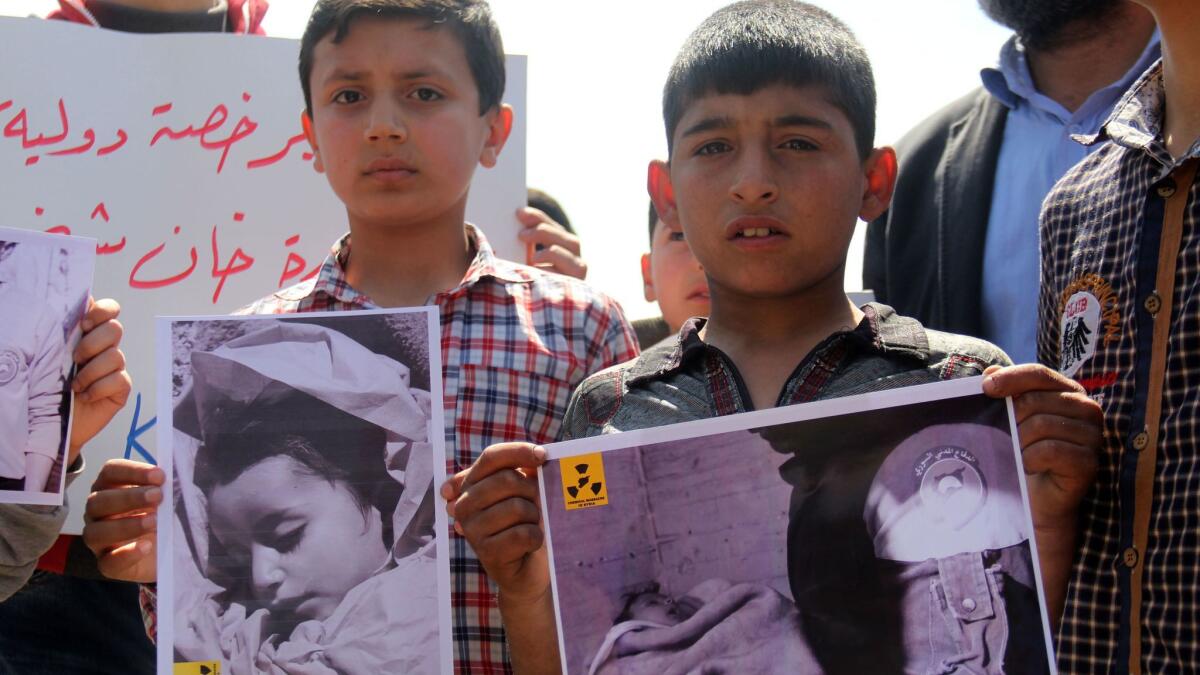U.S. says Syria may be using new weapons to deliver chemicals

- Share via
Reporting from Washington — The Trump administration on Thursday accused Syrian President Bashar Assad’s government of producing and using “new kinds of weapons” to deliver deadly chemicals despite committing to abolish its program in 2013, and said the world must find a way to stop it.
President Trump has not ruled out additional military action to deter attacks or punish Assad, administration officials said, although they did not suggest any action was imminent. They emphasized that the United States was seeking a new way to hold chemical-weapons-users accountable and wanted cooperation from Russia, Assad’s patron, in pressuring him to end the attacks.
Raising the alarm about the continued threat, U.S. officials said it was “highly likely” that Assad kept a hidden stockpile of chemical weapons after 2013 that he failed to properly disclose. They said information gathered from recent alleged attacks also suggested that Assad retained a “continued production capacity” — also banned under the 2013 deal.
There were no indications that the Syrian government, after seven years of civil war, had developed new, deadlier chemicals. Rather, the officials said they believed the weapons used to distribute the chemicals had evolved to become more sophisticated, potentially to evade international capability by making the origins of attacks harder to trace. The officials weren’t authorized to speak on the record and briefed reporters on the condition of anonymity.
More recent attacks have involved both chlorine, which has nonchemical uses and is easier to acquire, and the more sophisticated chemical sarin, the officials said. They said that in recent years, Assad has also adjusted his tactics to reduce the chances that attacks will be attributed to his forces.
That has made collecting evidence more difficult, though the United States believes it has a firm understanding of the extent of chemical use in Syria through a combination of intelligence, sample testing by third countries, and social media and other open-source information, the officials said.
Assad’s government has denied using chemical weapons, and its chief ally, Russia, has claimed that the reports are false attempts to pressure Syria’s government or provocations perpetrated by opposition groups. Syria and Russia have dismissed the conclusions of the Joint Investigative Mission, an expert body set up by the United Nations and the Organization for the Prohibition of Chemical Weapons, that determined Assad’s government used chlorine gas in 2014 and 2015, and sarin in April 2017.
Use of such widely deplored weapons comes with great risk for Assad, raising questions about why he would take the chance. But the officials said the United States believes Assad’s government sees chemical attacks as an effective way to terrorize rebels and sympathetic populations into fleeing, therefore altering the demographic balance in the Alawite heartland where Assad is trying to consolidate control.
More to Read
Sign up for Essential California
The most important California stories and recommendations in your inbox every morning.
You may occasionally receive promotional content from the Los Angeles Times.










